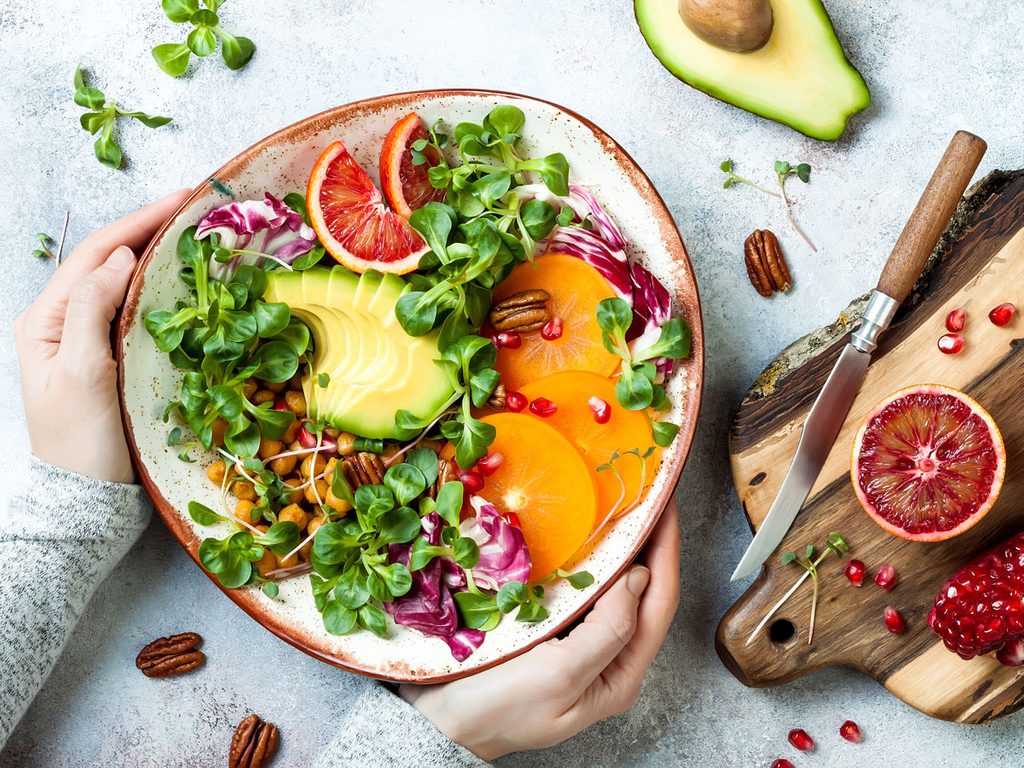Foods That Can Reduce Your Risk of Cancer

Eating certain foods can help lower your risk of developing cancer. Here are the foods you should eat, and which foods you should avoid.
There could be no more important goal than improving your health, and a great place to start is with your diet. And yes, new research shows that what you eat can affect your risk for developing cancer too. The Harvard T.H. Chan School of Public Health recently released an analysis of 20 studies and concluded that a high-fibre diet is an important component in helping to reduce the risk of both premenopausal and postmenopausal breast cancers. The research shows that women who ate the most fibre (compared to women who ate the least) were eight percent less likely to develop breast cancer.
(Related: What Doctors Want You To Know About Breast Cancer)
Increasing daily fibre intake should be a focus for all of us — the average North American eats only about half the daily recommended amount. And eating a high-fibre diet not only helps reduce your risk of developing cancer but also aids in weight management, lowers cholesterol, stabilizes blood sugar levels and promotes gut health (also known as a healthy microbiome).
Following a plant-based diet is an especially efficient way of increasing your daily fibre intake. Plus, with each bite of brightly coloured fruits and vegetables, and plenty of legumes, nuts, seeds and whole grains, you’re also getting power-packed phytochemicals (the compounds that contribute to a plant’s colour, smell and taste, found in all edible plant parts, especially the skin or peel). Research indicates some promising health benefits tied to phytochemicals — as long as they’re consumed in food, rather than supplement, form.
Here are some foods to focus on:
- Carrots, squash, tomatoes and dark leafy greens contain carotenoids, which may inhibit cancer growth and boost immunity.
- Apples, berries, citrus fruits, coffee, onions and soybeans contain flavonoids, which may help fight inflammation and tumour growth.
- Broccoli, Brussels sprouts, cabbage, cauliflower and kale contain indoles, which may help destroy cancer-causing chemicals.
- Leafy green vegetables contain lutein, which may reduce the risk of breast cancer and heart disease.
- Apples, citrus fruits and onions contain quercetin, which may help decrease inflammation.
- Cherries, citrus fruits and mangoes contain terpenes, which may help slow cancer cell growth and fight viruses.
Here are some foods to avoid:
Alcohol
Even small amounts of alcohol have been shown to increase the risk of developing cancer.
Red meat
A high intake of red meat may increase the risk of certain cancers. Limit red meat to one serving per week, and aim for at least one meat-free day per week (hello, meatless Monday!). Try this Chickpea and Lentil Meat(less) Ball recipe.
Deep-fried or grilled foods
High-heat cooking methods such as grilling, barbecuing and frying create harmful carcinogenic chemicals. Avoid burnt toast, and charred meats and vegetables. Cut off and throw away any charred portions.
(Related: 9 Pro Tips for Healthier Grilling)
Ultra-processed and prepared foods
These are almost always low in nutrients and high in added salt, sugar, food additives, preservatives, sweeteners, and unhealthy fats. They wreak havoc on the body by promoting inflammation (which increases the risk for developing chronic diseases, including cancer.) Avoid artificially sweetened beverages; boxed meals like macaroni and cheese, and taco kits; sugary cereals; microwaveable foods; processed deli meats and hot dogs containing nitrates; and pre-made pizza.
Sugars and refined carbohydrates
Added sugars promote chronic inflammation in the body. Avoid high-sugar breakfast cereals, store-bought cookies and cakes, candy, energy drinks, flavoured yogurts, fruit punch or juice “cocktails” or “beverages,” salad dressings, and soda.
How many servings per day?
Aim for five to nine servings of fruits and vegetables daily, including legumes, nuts and seeds, to ensure you’re getting enough fibre, phytochemicals, vitamins, minerals and protein from plant sources — while also getting protein and nutrients from a limited amount of animal products. At every meal, fill two-thirds of your plate with plant foods, and the remaining one-third with fish, skinless poultry or meat, or dairy. Aim to limit red meat, and avoid processed meat. Ensure your meals are colourful and full of variety, as this will help provide your body with the key nutrients, phytochemicals and natural inflammation-fighting compounds required for optimal health. And, best of all, you’ll feel fantastic.
Rebecca and Reisha Harper are twin sisters and registered dietitians with a special focus on nutrition for health, beauty and aging well.




